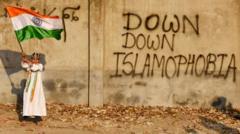The incident, arising from a house sale in a Hindu-majority neighborhood, reflects ongoing religious polarization in India. As protests erupted against the Muslim couple, calls for legal protections against discrimination surface, while the implications for communal harmony remain alarming.
Religious Tensions Surface as Muslim Couple Forced to Resell Home Amid Protests in India

Religious Tensions Surface as Muslim Couple Forced to Resell Home Amid Protests in India
A Muslim couple in Moradabad, India, faces discrimination from their Hindu neighbors, leading to their forced resignation from a newly purchased home, igniting national outrage over religious intolerance.
In a shocking display of religious tension, a Muslim couple in Moradabad, India, has been compelled to sell their newly acquired home following protests from their Hindu neighbors. The couple, both doctors, faced hostility after the sale by the previous owner, Dr. Ashok Bajaj, became public, sparking a fierce outcry among the local community in the affluent TDI City residential area.
Protestors voiced their discontent vehemently, with sentiments expressed by neighbor Megha Arora capturing widespread anxiety: “We cannot tolerate a Muslim family living right in front of our local temple… We will not allow them to enter and will continue to protest as long as they don't go away.” Many protestors subsequently lodged complaints at the district magistrate’s office, denouncing the sale and demanding the registration be overturned.
Dr. Bajaj, who operated an eye hospital and had been part of the community for over six years, expressed his disappointment at the community’s reaction and announced that the couple would be reselling the house to a Hindu family living in the society, stating, “Their safety concerns have made them uncomfortable.”
The episode has turned a spotlight on rising religious intolerance in India, particularly towards Muslims since the Hindu nationalist government came to power under Prime Minister Narendra Modi. Instances of anti-Muslim hate speech and communal violence have reportedly surged, particularly in states governed by the ruling Bharatiya Janata Party (BJP), including Uttar Pradesh, where Moradabad is located.
Political analysts underscore that such incidents signal a worrying trend of increasing religious polarization in India. Tanvir Aeijaz, a professor at Delhi University, remarked, “This case illustrates that religious segregation is manifesting at grassroots levels” and noted protests are not new, referencing the backlash witnessed in 2021 when Muslim families attempted to settle in predominantly Hindu neighborhoods.
The wider implications of this situation were highlighted by the fact that in many regions of India, Muslim families face housing discrimination. Reports indicate barriers in renting or purchasing homes in areas sternly controlled by Hindu residents, reflecting a pervasive climate of intolerance.
Echoing these sentiments, Prof. Aeijaz labeled the actions against the couple as “discriminatory and unconstitutional,” emphasizing the threat posed to India's foundational right to equality and freedom. As anger spills onto social media platforms, notable comments underline the disparity between India’s national identity and the prevailing reality.
Despite the opposition and social strife, some remain hopeful for change, with Prof. Aeijaz expressing optimism that Hinduism’s core values of pluralism and tolerance can win out against rising bigotry. “Most people I meet understand that hate is against their religion, and that gives me hope,” he asserted.
As the nation grapples with these divisive episodes, the plea for a united front against intolerance grows, urging communities to embrace the diversity that has historically been the bedrock of Indian society.




















